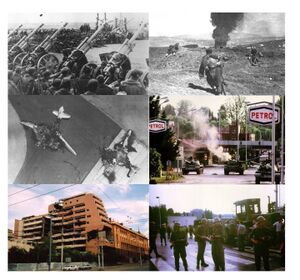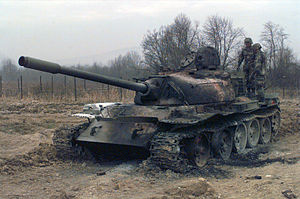User:BobOrson/Sandbox
| Vinalian Struggle | |||||||
|---|---|---|---|---|---|---|---|
 (clockwise from top left) Southern Vinalian Artillery in 1942. Northern troops advance along the Voly Na Heights in 1957. Northern tanks destroyed in the Battle of Vera 1975. Northern troops guard Nazica in 1965. Southern Ministry of Defence bombed in Velkarichka 1987. Southern planes destroyed in 1961. | |||||||
| |||||||
| Belligerents | |||||||
Supported by |
| ||||||
| Commanders and leaders | |||||||
|
|
| ||||||
|
| |||||||
| Strength | |||||||
|
6,000 (1965) 11,000 (1979) |
| ||||||
| Casualties and losses | |||||||
| 1,500 | 85,000 | ||||||
Assume everything is wrongly written oof The Vinalian Struggle (Narodyn:Віналія Боротьба ) is the name given to the series of conflicts between North Vinalia and South Vinalia from 1941 to 1987. Starting with the Second Vinalian Civil War in 1941, and ending with the 12 Day War in 1987. The war was marked by long periods of peace especially in the 1970's and 80's, and by short bouts of violence with the longest conflict being that of the Second Vinalian Civil War from 1941-1943.
The conflict had it's roots in the Chistovodian Civil War, and the ensuing establishment of the People's Republic of Vinalia (North Vinalia), and the Republic of Vinalia (South Vinalia), following the First Vinalian Civil War between 1933-1935 and it's inconclusive end. The Southern Invasion of the North in 1941 would spark the conflict but little would be achieved as both sides reached a peace agreement in 1943. The North would in 1955 (100 Day War) launch an offensive against the South with great success, and again in 1961 (3rd Vinalian Civil War) where the Northern Vinalian Army would achieve the greatest push against it's Southern counterpart, with peace being reached in 1962. Following the establishment of a military junta in the South, and greater radicalization from both sides would see the start of the Dirty War, as sponsored militias from both sides carried out terror attacks on the other. This would culminate in the Northern invasion in 1975 (31 Day War), with a decisive Northern defeat. In 1987 with a failing economy, and internal instability would lead to a Southern invasion in 1987 (12 Day War), where Southern forces would be decisively defeated, the Treavy of Vina would end hostilities.
The conflict showcased periods of ideological, and ethnical genocide, with acts of terrorism sponsored by both sides being carried out. Terror bombings alongside death squads were marked for their brutality specially in the South where government forces murdered 15,000 Vinakians between 1964 and 1973. Some 150,000 soldiers are estimated to have died across the variety of conflicts with some 350,000 injured, with estimates on civilian casualties ranging from 30,000 to 80,000 civilians killed, with over 300,000 injured.
Prelude
The Chistovodian Civil War had exploded in 1928, at first sec
First Vinalian Civil War (1933-1935)
With victory in Chistovodia secured the People's Army turned their attention to the south of the nation, where former Babych supporters had congregated, along with anti-socialist militias. With Chistovodian support, North Vinalian forces attempted to reconquer the south in 1933 with the Mollas Offensive, North Vinalian forces were unable to breakthrough and both nations settled into a 2 year long stalled war. Repeated Northern attempts were met with strong southern defences and by 1935 the war had grown unpopular with the Northern population, and peace was reached between both states. The south still claiming the entirety of the former Chistovodia settled for the establishment of a democratic Vinalian government, establishing the Republic of Vinalia.
Border disputes arose immediately as hundreds fled from the north to the south of the nation fearing purges, many Vinakians sought to escape to the north likewise fearing reprisals for their aiding of northern groups during the civil war. Both nations began the process of reconstruction and re armament to engage one another, with both sides acquiring surplus Great War equipment to rebuild their armies.
Second Vinalian Civil War (1941-1943)
Both Vinalia's had by the 1940's rebuilt their armies, and were ready to resume the war, the South had aggressively acquired foreign equipment , while the North relied on stocks from Swetania and Chistovodia. Yankul Kamenov President of South Vinalia had in the Congress of 1940 in November proclaimed their desire to unite Vinalia under democracy, prompting Northern forces to begin planning an invasion of the south, confident of their numerical advantage.
By January both sides were ready to cross the ceasefire line, South Vinalian forces were well aware of Northern preparations and had decided in February to launch a preemptive strike, the striked overwhelmed Northern forces and after the capture of 5,000 soldiers in the 2nd Battle of Mollas, where Southern forces were able to penetrate the Northern rear using tanks and force the Northern troops back. The Northern had by March suffered some 15,000 casualties, and was on complete rout assuming defensive positions in front of the Juricia river. The Socialist world mobilized with Swetanian regulars designated as volunteers joining into the defensive line along with Chistovodian units seeking to prevent the collapse of the North. The Southern army had trouble in clearing up the pockets of left behind Northern troops and was delayed in it's advance, supply problems also crippled the Southern army as saboteurs attacked supply convoys and infrastructure to prevent further Southern push. The South would reach the Juricia river and after an attempt the 29th of March, would settle into defensive positions as it bombarded the Northern forces with heavy artillery emplacements.
Southern forces had by mid April regrouped, and attempt once more to breakthrough the Northern lines on the 15th of April. The Southern forces had met with great success as they attacked weakened and exhausted Northern forces, quickly routing them and opening a gap in the line, fearing a complete breakthrough Swetanian volunteers were rushed to the gap with fierce fighting between both sides the 16th and 17th of April. By the 18th Swetanian volunteers along with Northern reinforcements had stopped the Southern attack which had open a large salient. Southern forces would attempt once again on the 29th to break the Swetanian forces, but concentrated artillery along with mass charges by North Vinalian soldiers would stop the Southern push on it's tracks, having suffered some 10,000 casualties along with 50 destroyed tanks, the South settled into a defense of the Salient.
Both sides rushed to reinforce their forces, as Northern troops prepared for an offensive against the salient, while the South geared it's forces for a push further upstream
but were unable to break the Northern lines taking heavy casualties, the South would attempt another breakthrough the 25th, with similar results. The Northern army had been regrouped and re armed, and was ready to launch it's own attack by May. Southern forces severely depleted from equipment and after having lost local air superiority, suffered at the Battle of Juricia between the 22nd of May and the 1st of June, where Northern forces broke through Southern forces with Swetanian soldiers serving as spearhead for the Northern attack. Southern forces were quick to retreat further inland suffering some 8,000 casualties. Both sides would settle into into a defensive line where both sides would remain until 1943, when peace was achieved. The war was technically a Southern victory as they had moved the ceasefire line up north by some 10 km's.
100 Day War (1955)
Third Vinalian Civil War (1961-1962)
31 Day War (1975)
Following the Southern defeat in 1962 and the overthrow of the democratic government by Stefan Tretyak, South Vinalia entered into a period of economic and social stagnation as the military junta devoted all resources to the army and it's rebuilding. Many throughout the nation feared a renewed Northern offensive, as the North held considerable economic and military advantage over the South
With tension around the inner border between both nations, Danylo Palij moved to secured





